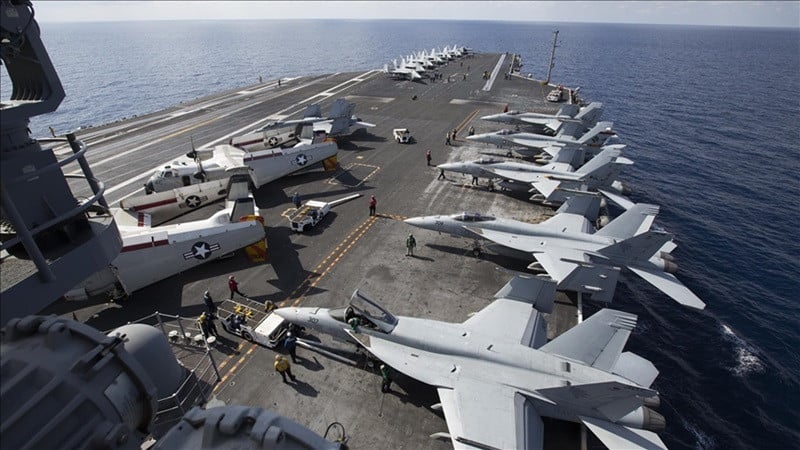ANKARA:
Rising tensions between Israel and Iran have brought the region closer to the brink of war, with the US reiterating its commitment to defending Israel.
The US has a significant military presence in the Middle East, with approximately 45,000 personnel, numerous bases, and formidable air and naval fleets, heightening concerns of a potential regional conflict.
Last week’s assassination of Hamas political chief Ismail Haniyeh in Tehran and the killing of Hezbollah commander Fouad Shukr in Lebanon escalated tensions, prompting speculation about Iran’s potential retaliation.
As the world watches for Tehran’s next move, questions arise about how the US will support its long-standing ally Israel.
Washington’s military presence in the Middle East dates back decades, peaking in 2007 with 160,000 personnel in Iraq and over 100,000 in Afghanistan in 2011.
Despite a reduction in Iraq and the 2021 withdrawal from Afghanistan, the US deployed additional troops to the region since the start of Israel’s assault on Gaza on Oct. 7.
According to US media reports, the American military operates from numerous bases across the region, maintaining a rotational force of around 45,000 troops.
The largest base is Al Udeid Air Base in Qatar, established in 1996, which serves as the regional headquarters for the US Central Command (CENTCOM).
Some 8,000 personnel are stationed there, emphasizing its strategic importance.
In Bahrain, the US 5th fleet headquarters hosts around 9,000 personnel as of 2022, while Kuwait, a key logistical hub during the 2003 Iraq war, houses 13,500 troops.
The United Arab Emirates accommodates around 3,500 US military personnel, along with critical ports for the US Navy.
Jordan, a crucial ally, hosts about 3,000 American troops, despite a deadly attack on its Tower 22 base by Iranian-backed Iraqi militias in January. Jordan’s geographic proximity to Israel and strong ties with the US and UK make it pivotal for intelligence operations in Syria and Iraq.
As of December 2022, more than 2,700 US troops were stationed in Saudi Arabia to train and advise its armed forces and protect US interests in the region from Iran and its proxies. Oman, hosting a few hundred airforce personnel, and other smaller deployments across the region, contribute to the broader US military strategy.
In Israel, the US presence includes the secretive Site 512 base, crucial for radar surveillance against ballistic missile threats. American troops also support the Iron Dome missile defence system at Nevatim Airbase in the Negev Desert.
Iraq and Syria
The US maintains around 3,500 personnel in Iraq and Syria. In Iraq, the US reduced its military presence to 2,500 personnel in 2021, shifting entirely to non-combat advisory roles.
These troops, stationed at bases including Al-Asad Airbase in western Iraq’s Anbar province, focus on training Iraqi forces, providing consultancy, and supporting intelligence efforts against Daesh/ISIS.
The US currently has around 900 special forces soldiers in Syria to support the terrorist group YPG/PKK, which uses the name SDF.
The US has smaller bases such as the al-Omar oil field and Al-Shaddadi, mostly in the country’s northeast, and a small outpost known as the Al-Tanf garrison near Syria’s border with Iraq and Jordan.
Naval power
The Pentagon announced additional deployments of warships and aircraft to the Middle East following Haniyeh’s assassination, reinforcing its presence in the Mediterranean and Red seas.
There are 18 American ships in the region, including the aircraft carrier USS Harry S. Truman and three guided missile destroyers – the USS Lassen, USS Farragut, and USS Forrest Sherman – as well as the guided missile cruiser USS Normandy.
The US announced that it would deploy two aircraft carriers, the USS Gerald Ford and USS Eisenhower, support ships, and some 2,000 marines after Oct. 7.
The Pentagon also ordered the deployment of additional fighter jets to support the existing A-10, F-15 and F-16 fleets in the Middle East.











